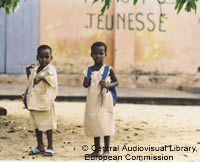New study shows key impact of energy research on poverty
As the World summit on sustainable development in Johannesburg approaches, a new study has shown that research on affordable energy which does not rely on biomass is needed to address the problems of the world's poor. 'Energy and poverty' is a study drawn up by the International energy agency (IEA) analysing the future trends of energy availability and consumption in developing countries. It concludes that, despite the efforts of meetings such as the one in Johannesburg, the 1.6 billion people without electricity in the world today will only have reduced to 1.4 billion people by 2030. The study also emphasises that the estimated 2.4 billion people in the world who rely on biomass (wood, dung and agricultural residues) face health problems from this practice and also add to environmental problems. Wood often involves unsustainable use of trees, while dung and agricultural residues are associated with methane and carbon dioxide emissions. The IEA estimates that the number of people using biomass will increase to 2.6 billion people by 2030. 'There can be no economic development without secure affordable energy,' said Robert Priddle, the IEA's executive director.

